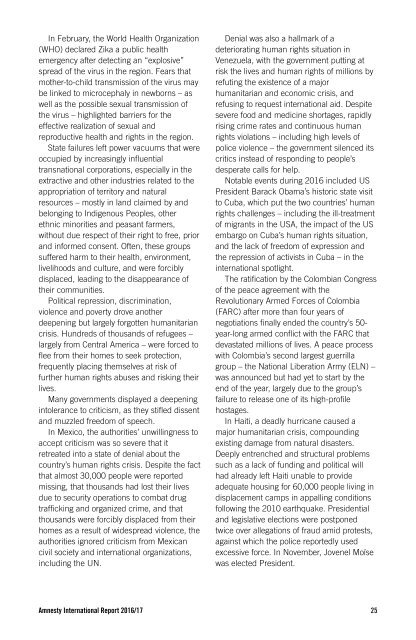AMNESTY INTERNATIONAL REPORT 2016/17
2lEHU9j
2lEHU9j
You also want an ePaper? Increase the reach of your titles
YUMPU automatically turns print PDFs into web optimized ePapers that Google loves.
In February, the World Health Organization<br />
(WHO) declared Zika a public health<br />
emergency after detecting an “explosive”<br />
spread of the virus in the region. Fears that<br />
mother-to-child transmission of the virus may<br />
be linked to microcephaly in newborns – as<br />
well as the possible sexual transmission of<br />
the virus – highlighted barriers for the<br />
effective realization of sexual and<br />
reproductive health and rights in the region.<br />
State failures left power vacuums that were<br />
occupied by increasingly influential<br />
transnational corporations, especially in the<br />
extractive and other industries related to the<br />
appropriation of territory and natural<br />
resources – mostly in land claimed by and<br />
belonging to Indigenous Peoples, other<br />
ethnic minorities and peasant farmers,<br />
without due respect of their right to free, prior<br />
and informed consent. Often, these groups<br />
suffered harm to their health, environment,<br />
livelihoods and culture, and were forcibly<br />
displaced, leading to the disappearance of<br />
their communities.<br />
Political repression, discrimination,<br />
violence and poverty drove another<br />
deepening but largely forgotten humanitarian<br />
crisis. Hundreds of thousands of refugees –<br />
largely from Central America – were forced to<br />
flee from their homes to seek protection,<br />
frequently placing themselves at risk of<br />
further human rights abuses and risking their<br />
lives.<br />
Many governments displayed a deepening<br />
intolerance to criticism, as they stifled dissent<br />
and muzzled freedom of speech.<br />
In Mexico, the authorities’ unwillingness to<br />
accept criticism was so severe that it<br />
retreated into a state of denial about the<br />
country’s human rights crisis. Despite the fact<br />
that almost 30,000 people were reported<br />
missing, that thousands had lost their lives<br />
due to security operations to combat drug<br />
trafficking and organized crime, and that<br />
thousands were forcibly displaced from their<br />
homes as a result of widespread violence, the<br />
authorities ignored criticism from Mexican<br />
civil society and international organizations,<br />
including the UN.<br />
Denial was also a hallmark of a<br />
deteriorating human rights situation in<br />
Venezuela, with the government putting at<br />
risk the lives and human rights of millions by<br />
refuting the existence of a major<br />
humanitarian and economic crisis, and<br />
refusing to request international aid. Despite<br />
severe food and medicine shortages, rapidly<br />
rising crime rates and continuous human<br />
rights violations – including high levels of<br />
police violence – the government silenced its<br />
critics instead of responding to people’s<br />
desperate calls for help.<br />
Notable events during <strong>2016</strong> included US<br />
President Barack Obama’s historic state visit<br />
to Cuba, which put the two countries’ human<br />
rights challenges – including the ill-treatment<br />
of migrants in the USA, the impact of the US<br />
embargo on Cuba’s human rights situation,<br />
and the lack of freedom of expression and<br />
the repression of activists in Cuba – in the<br />
international spotlight.<br />
The ratification by the Colombian Congress<br />
of the peace agreement with the<br />
Revolutionary Armed Forces of Colombia<br />
(FARC) after more than four years of<br />
negotiations finally ended the country’s 50-<br />
year-long armed conflict with the FARC that<br />
devastated millions of lives. A peace process<br />
with Colombia’s second largest guerrilla<br />
group – the National Liberation Army (ELN) –<br />
was announced but had yet to start by the<br />
end of the year, largely due to the group’s<br />
failure to release one of its high-profile<br />
hostages.<br />
In Haiti, a deadly hurricane caused a<br />
major humanitarian crisis, compounding<br />
existing damage from natural disasters.<br />
Deeply entrenched and structural problems<br />
such as a lack of funding and political will<br />
had already left Haiti unable to provide<br />
adequate housing for 60,000 people living in<br />
displacement camps in appalling conditions<br />
following the 2010 earthquake. Presidential<br />
and legislative elections were postponed<br />
twice over allegations of fraud amid protests,<br />
against which the police reportedly used<br />
excessive force. In November, Jovenel Moïse<br />
was elected President.<br />
Amnesty International Report <strong>2016</strong>/<strong>17</strong> 25


